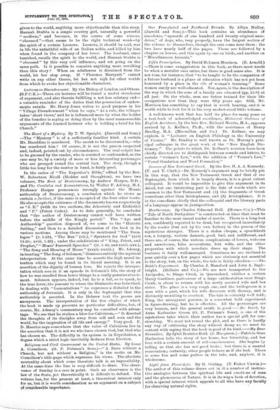In the series of "The Expositor's Bible," edited by the
Rev. W. Robertson Nicoll (Hodder and Stoughton), we have two volumes, The Book of Deuteronomy, by Andrew Harper, D.D. ; and The Canticles and Lamentations, by Walter F. Adeney, M.A. Professor Harper pronounces strongly against the Mosaic authorship of Deuteronomy, a conclusion which he views as certain a fortiori, if the same is accepted of the four other books. He also accepts the existence of the documents known respectively as "J. E." (with its two sections, the Jehovistic and Elohistic) and "P." (Priest Codex). As to date generally, he concludes that "the author of Deuteronomy cannot well have written before the middle of the Kingly period." The "Age and Authorship " question disposed of, we come to the " Historic Setting," and then to a detailed discussion of the book in its various sections. Among these may be mentioned " The Deca- logue " (v. 1-23), " The Ban " (vii.), " Speakers for God " (xvii 14-20; xviii. 1-22) ; under the subdivisions of " King, Priest, and Prophet," " Moses' Farewell Speeches " (iv. 1-40, and xxvii.-xxx.), " The Song and Blessing of Moses " (xxxii.-xxxiii.) Mr. Adeney, in treating " The Song of Solomon," dismisses entirely the mystical interpretation. At the same time he asserts the high moral in- tention which may be found in its literal meaning. It is an assertion of the dignity of human love. He rejects the interpre- tation which sees in it an episode in Solomon's life, the story of how he was recalled from lower things to a really genuine attach- ment. Solomon appears, indeed, but he is a foil, so to speak, to the true lover, the peasant to whom the Shulamite was betrothed. In dealing with "Lamentations" he expresses a disbelief in the authorship of Jeremiah. It is only in the Septuagint that this authorship is asserted. In the Hebrew text the poems are anonymous. The interpretation of the five elegies of which the book is made up presents no particular difficulties, but, of course, Mr. Adeney's commentary may be consulted with advan- tage. We see that he strikes a blow for Calvinism,—" It directed the thoughts of its disciples away from self and man and the world, for the inspiration of all life and energy." Very good. F. D. Maurice says somewhere that the value of Calvinism lies in the assertion that it is not we who have chosen God, but God who has chosen us. The difficulty in its system is in Reprobation, a dogma which a strict logic inevitably deduces from Election.
















































 Previous page
Previous page